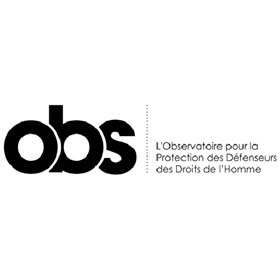The Observatory for the Protection of Human Rights Defenders: Third day of the trial against Ales Bialiatski shows clear signs of a politically-motivated trial
Paris-Geneva, November 7, 2011.
November 4, 2011 marked the third day of the trial held in Minsk against FIDH Vice-President and "Viasna" President Ales Bialiatski, judicially harassed by the authorities of Belarus in relation to his legitimate human rights activities.
On the second day, Mr. Ales Bialiatski appeared in court behind bars, very pale, but also very clear when answering about his professional activities. On the first day of his trial, Mr. Ales Bialiatski was not allowed to have lunch, nor to drink. When he was interrogated for more than two hours, he stood up, with his documents in the hands whereas the interrogators, the prosecution and the judge were sat-down.
On the first day of this trial, the defendant had submitted two requests to waive the pre-trial detention measure against Mr. Bialiatski and to enable him to attend his trial freely. The two requests were refused by the judge. But the Public Prosecutor immediately after indicated that this prevention measure was usually not the one chosen for this kind of crime, and that if Mr. Bialiatski accepted to "cooperate with the court", the prosecution could ask for the waiving of the pre-trial detention measure. This clearly demonstrates that this pre-trial detention measure is not related to the fact that the latter "could escape the court" (as motivated by the judge when declining the defence request), but that it is in reality a repressive and politically-motivated measure, which is contrary to international standards and the Belarusian law itself in this regard.
A number of politically-motivated questions were made to the witnesses, which were not related whatsoever with the charges of "tax evasion" pending against Mr. Bialiatski. Questions were asked concerning the legality of the existence, action and functioning of Viasna, and on the possible membership to that organisation. Witnesses invoking their constitutional right to keep silent were on some occasions asked the same questions in a row, slightly reformulated. Mr. Bialiatski's lawyer also pointed that the police representative of the tax department appearing in court as a witness had been unable to provide orally the same elements as those appearing in written in the investigation documents. More than this, her answers at the investigation stage were equivalent up to the grammatical mistakes to the testimonies of her hierarchical superior.
A number of witnesses of the prosecution appeared to be technical experts - specialists of the banking system or of the tax police - rather than witnesses of the case at hand. When asked about the substance of the case, one of them replied that he was not at all aware of the case.
The November 3 hearing ended by the reading of part of a list of written documents related to the case against Mr. Bialiatski, including a note prepared by the KGB stating that Mr. Bialiatski and Mr. Valentin Stefanovic had bank accounts abroad to finance their activities allegedly in support “of radical opposition”. This letter in reality is the root of the request sent to the authorities of Lithuania and Poland to obtain information about bank accounts Mr. Bialiatski opened there in order to finance Viasna's activities. This element also shows that the real reason behind such harassment is not alleged tax evasion, but clearly Viasna's activities.
At the November 4 hearing, the third day of the trial, it was mentioned that an anonymous letter allegedly transmitted to the KGB led to the opening of the investigation against Mr. Ales Bialiatski. The defendant argued that according to the Belarusian Criminal Procedure Code, anonymous documents could not lead to the opening of an enquiry. Mr. Bialiatski's lawyer added that the documents received from the authorities of Poland and Lithuania were poorly translated, unsigned and not certified true copy.
The regularity of the getting by the investigators of private correspondence between Viasna and their international partners included in the case file was also put into question by Mr. Bialiatski's lawyer, as there is no evidence that the Deputy Prosecutor of Minsk gave an authorisation to search for this type of documents.
Mr. Bialiatski's lawyer then highlighted during the hearings that the Prosecutor had not stated which criteria was used to consider those money as Mr. Bialiatski's income, and that during the investigation, the investigators had been explicitly requested to contact funding organisations to enquire about the purpose of their financial assistance to Viasna. Such request was reportedly not met.
Furthermore, an access to the trial was strictly controlled, a list of all people present with all their passport details was established for every session, participants were searched (including a body search) and filmed. Those who had a t-shirt with Mr. Ales Bialiatski’ portrait on it were not allowed inside and in one case were forcibly pushed out.
The Observatory calls upon the Belarusian authorities to release Mr. Ales Bialiatski immediately and drop all charges against him, as his detention and judicial harassment seem to merely aim at sanctioning his human rights activities, and the trial orchestrated and set by the authorities has clearly demonstrated it.
The Observatory urges the authorities to comply with Belarus’ commitments under Article 1 of the United Nations Declaration on Human Rights Defenders, which states that “everyone has the right, individually and in association with others, to promote and to strive for the protection and realization of human rights and fundamental freedoms at the national and international levels”.
For day by day up-dated information on this case, please see: http://freeales.fidh.net/ as well as the previous Urgent Interventions issued by the Observatory.
Contacts:
l FIDH : Karine Appy / Arthur Manet: + 33 1 43 55 25 18
l OMCT : Delphine Reculeau: + 41 22 809 49 39


















